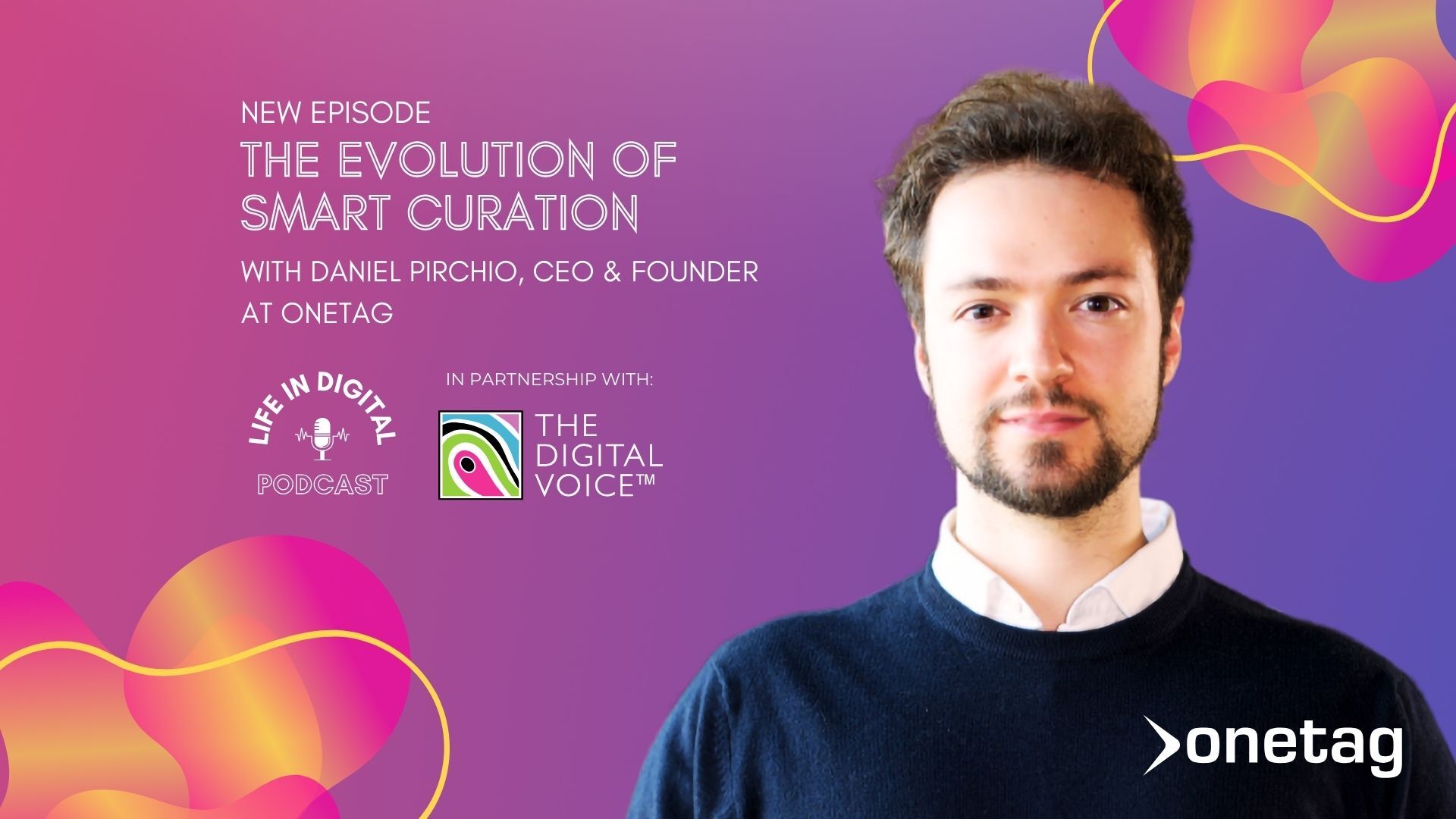AI is not a human talent replacement, it’s an additive.
06 Feb, 20245 minsSmart technology is making digital advertising more data-driven, automated, and responsive. ...

Smart technology is making digital advertising more data-driven, automated, and responsive.
Grasping immediate impacts for brands and agencies, and how the tech-augmented future will unfold isn’t easy. But embracing each innovation in turn does help create deeper pockets of understanding, which add up to a better picture of the ecosystem and the ability to judge where it’s headed. That’s the philosophy of our latest Life in Digital Podcast guest, Evgeny (Ev) Popov, in his role as international Executive Vice President & General Manager, International at Verve Group.
With 20 years experience spanning digital operations, technology and product development, and data management, Ev shares his views on the biggest industry trends and how they will intersect – including artificial intelligence (AI) and consumer privacy.
Navigating the ad tech wildlands
Maintaining a sure footing in the ad tech wildlands means not getting dazzled by new tools. While adapting to recent advances is vital, Ev feels focusing too heavily on the possibilities of emerging solutions can mean other important changes are overlooked, such as evolution in consumer behaviours and preferences.
“The digital marketing landscape has changed completely, because we have the introduction of Gen Z, and millennials gaining more purchasing power.” Starting in 2022 and gaining pace over 2023, this change in generational dominance is fueling what Ev dubs a “tectonic shift in demographic composition”, which means marketers must reconfigure their strategies to cater to different requirements and tastes. Moreover, he suggests there is a strong link between the interests of these digitally native cohorts and an increasing swing towards social media, live commerce, voice search, augmented reality (AR), and AI in marketing plans.
Echoing discussions at CES this year, Ev points out that “the new word in this lexicon is digital experience”, with the blend of physical and digital – known as “phygital” – becoming more relevant to brand interaction. As tech-led content consumption sparks higher demand for immersive custom experiences enriched by mixed reality, Ev even sees the popularity of AR among audiences as a potential prelude to re-invigorated Metaverse development.
However, alongside fresh opportunities for multi-layered audience connection, marketers are also facing greater challenges with ad targeting, as access to user-level insight fades. So, how does Ev feel about Google’s third-party cookie deprecation?
Cookie loss won’t stunt advertising effectiveness
Ev’s perspective on cookie eradication is simple: “I’m happy it’s finally happening.” Now that attention can at last move from preparation to adaptation, he also has a defined idea of the alternative strategies and solutions industry players need to leverage.
Building stores of first-party data is number one on his list, as part of a holistic management strategy that includes CRM, acquisition, email marketing, and cross-channel interaction data. As well as boosting customer loyalty to sustain data inflow, Ev recommends brands begin by considering its usage carefully, asking themselves “What can I do with that data? Is it consented or not? What is the best way of activating it?”
Contextual targeting is another prime post-cookie option, with Ev keen to highlight that the 20-year-old technology has entered “a different stratosphere” thanks to machine learning. “You have pure NLP (natural language processing), which looks at semantic web content classification and segmentation. Now we have version 2.0, with LLM (large language models) coming in and giving you more depth of human understanding. There’s a construct called NLU (natural language understanding) which is transitioned from NLP and takes us from understanding context to how do I interpret sentiment and current emotion state.”
But what about Google’s proposed privacy-preserving solutions?
“Let’s not forget Privacy Sandbox, including the Topics API. Vendors will definitely embrace that and start interfacing with cohorts, or group targeting, which has the right level of anonymity.” Ev believes Google’s on-device processing approach and federated learning hold promising potential to enable privacy-safe (and GDPR-compliant) ad targeting while curbing the risk of fingerprinting and the need to rely on ad IDs – predicting faster deployment across the next year. At the same time, he expects increased consolidation of alternative IDs to combat complications driven by “too many players trying to do similar things.”
The smart tech future isn’t just about GenAI
Chiming with findings that 63% of CMOs are set to bolster their investment in Generative AI over the next 12 months, Ev acknowledges that the hype around deep learning and LLM tools isn’t set to dissipate soon. “Anyone who’s anyone has experimented with ChatGPT, but I think what will be interesting to see is how sophisticated AI can become.” In the future, this may include the leap to quantum and self-awareness, but at present, innovation will likely mean diversification of prompts: “moving to more multi-modality of input, from images and videos, and outputs that are not just text-based.”
When it comes to powerful advertising use cases, however, Ev wants us to look beyond generative AI. His hotly tipped area to watch is predictive analytics fueled by consented data, which will drive “personalisation without personal data” by allowing marketers to fine-tune experiences in line with predicted preferences and interests, not individual tracking.
“The big hope from AI is to be able to crunch through huge volumes of data inexpensively and infer behaviour [of consumers] or purchase intent.” He adds that tools designed for emotion recognition and gesture assessment are making this vision a reality by gathering data about mobile movements and voice searches to feed algorithmic analysis: “You have this intent prediction and human-computer interaction for the LLMs and machine learning. So, you can look at inferring demographics, like age, gender, and ethnicity based on gestures and speech patterns.”
With their ability to assess trends and patterns at scale, Ev argues AI models allow brands to efficiently create anonymised profiles that strengthen audience understanding, and inform accurate targeting while protecting privacy.
Now and next: how will intelligence tools impact ads?
On a near-term basis, Ev expects beneficial outcomes from AI’s infusion into the ecosystem, forecasting: “improvement in ROI, and on the consumer side, 100% enhanced engagement under that personalization. I think there'll be a fundamental shift in advertising strategies. So, how can we utilise more predictive analytics and AI-driven decision-making? This is not new, but it will be propelled with a new reality of AI and power behind the user interface.”
Further ahead, the picture is slightly more mixed. Another seismic change in the industry, and any other sector adopting AI, will be an adjustment in the ratio of machine and human work. As Ev observes, “Every job will be affected. That’s a given”, but he advises that accepting this new paradigm and seizing its advantages will be essential to ensure lasting gains.
The focus, he says, needs to be on thinking deeply about ethical AI handling. Part of that will be figuring out the “AI plus human intelligence construct. How do we use AI as an input and use our own intelligence to craft it to be more effective?” But just as crucial is a framework for privacy-first AI implementation: “AI will push data ethics to the forefront, understanding what the ethics really mean, what data can be mined, how we protect and use particular content. All of that data must be scrutinised and understood.”
Ultimately, Ev stands firm in predicting that advertising will be slicker, sharper, and more agile, with AI assistance. He also offers a final thought for those hesitating to welcome the new age: “Don’t be resistant. Try to understand it, embrace it, and empower yourself to do things better. Whoever is fastest to embrace these tools, wins. But also, they are incremental to your intelligence. AI is not a replacement, it’s an additive.”




